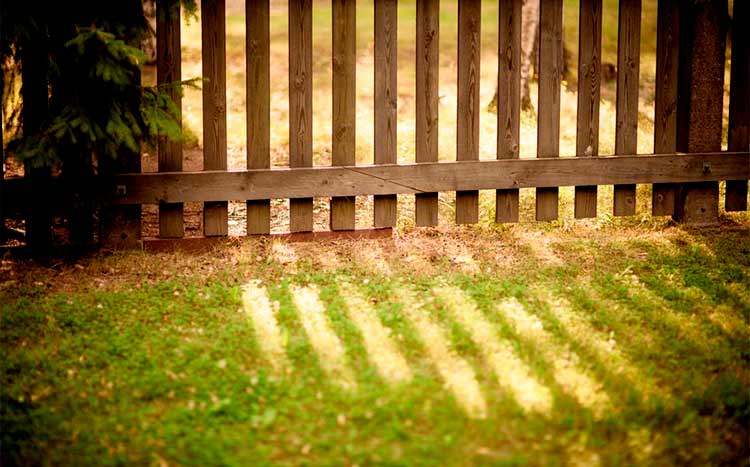Fencing and property lines are a common cause of disputes among neighbors in Pennsylvania. Since most homeowners don’t know the state’s fence laws, many neighbors resort to litigation whenever conflict arises.
While going to court isn’t a bad thing, it can breed bad blood between neighbors, and this never ends well. A better way to resolve your fence conflicts is by implementing the Pennsylvania property line and fence statutes.
Do I need a permit to build a fence in Pennsylvania?
It depends on the kind of fencing. Most cities and local authorities in PA will demand a building permit for fences that are:
- Taller than 6 feet in height
- Situated directly along a street front
- Made from heavy materials such as concrete or masonry
You might also need to obtain a zoning permit if the fence will be 50% opaque or more. If the property is located in a flood hazard area, you’ll need to submit a flood protection form alongside your permit applications.
An exception to obtaining a permit is if you’re replacing the fence with a similar structure on the exact spot. In such a case, your previous permit will still hold for the construction.

How close to the property line can I build a fence?
The fence proximity regulations vary in different towns and neighborhoods based on the local laws of the area. However, in most towns in the PA, all fences from all sides should be set back at least 6 inches from the property lines.
In other towns, the regulation is at least 12 inches from the front yard property lines. Overall, the jurisdiction of property line setbacks in PA is between 3 – 12 inches.
To be safe, always look into the rules in your local area and the regulations from your Homeowners Association.
What is the “Doctrine of Contestable lines” in PA?
The doctrine of Contestable lines refers to a Pennsylvania Supreme Court ruling that allows courts to remap boundary property lines when settling disputes between adjoining neighbors.
This doctrine allows property title switching among adjoining neighbors once they agree upon a boundary, whether by recognition and acquiescence or compromise and dispute.
For this doctrine to apply, here are the conditions in both cases:
Boundaries by recognition and acquiescence:
- Each adjoining neighbor must claim the land on their side of the property line to be their own
- The fence should have been in place for a minimum period of 21 years
Boundary by dispute and compromise:
- There must be a dispute between adjoining neighbors over the location of the property lines.
- A new property line should be established following the dispute
- The parties involved must agree to respect the new boundary line and be willing to drop their legal suits.
How tall can a privacy fence be in Pennsylvania?
Height restrictions in the state vary depending on your HOA rules and town laws. But the majority of them allow fence heights to a maximum of 4 feet on the front yard side and 6 feet for the rear and side yard fence.
In industrial zoning districts, the height restrictions stand at 8 feet. You can also apply for a variance if you intend to erect a fence taller than these regulations.
If you’re not sure of your area’s limitations, consult a local fencing company in the area.
Who owns the fence on property lines in PA?
The Pennsylvania fence laws recognize all adjoining neighbors as joint owners of the fence on the property line.
This means that each neighbor is required to contribute to the costs of maintenance, installations, and repairs. Any neighbor who wishes to remove the fence will need to seek the permission of the other adjoining neighbors.
If one neighbor doesn’t wish to contribute to the installation or maintenance of the fence, they can successfully argue out their case. The PA fence laws will, however, consider any neighbor with livestock responsible for the fence even if they don’t want it.
Does a fence define the property line?
Not always. While most fences are usually built on the property line, some aren’t always located precisely on the property line.
Many homeowners set back their fence at least a foot or two from the property line. You, therefore, can’t rely on the fence to define your property line.
However, if adjoining neighbors meet and agree on a boundary line and then erect a fence, even if it’s not on the correct property line, the law may recognize that fence as the property line.
The best way to define your boundary is by hiring a surveyor to mark the property line. You can also check your local assessor’s office or website for the data on your property line.

What is property line encroachment?
Property line encroachment occurs when one neighbor trespasses into another’s property by building structures like a fence or shed on their side of the property line.
In Pennsylvania, most homeowners aren’t aware of this encroachment, and this comes to bite them once they plan to resell the home.
In cases where the neighbor has encroached and has used your land for 21 years, they might be able to legally claim the title for that ‘encroached portion’ through Pennsylvania’s Adverse Possession doctrine.
To avoid such a complication, you need to be aware of the location of your property lines. If you find any encroachment activities from your neighbor, talk to them to have the fence moved.
Under the PA laws, you’re also allowed to take legal action against any encroaching neighbor on the grounds of trespassing.
Is it legal to put up barbed wire around your property?
It depends on the regulations of your local municipality or district. In most urban areas in Pennsylvania, putting up barbed wires around your property is illegal as it’s considered harmful to animals and children.
These regulations may be different in several rural districts. In some local HOAs, you may need to get permission from your neighbor.
So, always confirm with your local authority.
Are spite fences legal?
No! Although there’s no law against spite fences, Pennsylvania is one of the 14 states in the country that has enacted a statute forbidding them.
Your neighbor can sue you on grounds of nuisance complaints if they have substantial evidence of your intentions for building the fence.
All they have to prove is that they own the land and that your actions interfered with their enjoyment of the property.
Do I have to tell my neighbor I’m putting up a fence?
If the fence is on the property line, you have to tell your neighbors. Pennsylvania fence laws consider adjoining neighbors as co-owners of a boundary fence. Therefore, you can’t put up a fence without their permission.
For a fence that’ll be on your side of the property line, you aren’t required by law to inform your neighbor. However, you’ll save yourself a lot of conflict by doing so.
Keep in mind; Some municipalities and HOAs require that you send your neighbor a written notice before starting the construction.
Pennsylvania boundary fence laws at a glance
This table provides an overview of some of the state laws governing Pennsylvania fence law and links to their original documents.
| Statues | Fence regulations by city |
|---|---|
| Pennsylvania 29 § 42 Owner improvements of a division fence Pennsylvania 29 § 41 Compelling Payment or Partial Construction Pennsylvania 18 §1107 Restitution for theft of timber | Fence ordinances City of Allentown Fence Regulations City of Greenberg Fence Regulations City of Lancaster Fence Regulations City of Pittsburgh |
Keep in mind: These laws are bound to change with time depending on the new legislation, federal court decisions, and other initiatives. Use the information provided above as a guide and research the latest regulations in your municipality.
FAQ’s
Can a neighbor remove a fence?
Yes. If the fence lies at least two feet inside their property line, the neighbor has the freedom to remove the fence. But if that is a fence on the property line, they’ll need your consent to proceed with the removal.
If the fence is on your side of the property line, the neighbor also doesn’t have the right to remove it. If they do so, that can be considered trespassing.
What if the fence is over the property line?
If your fence is encroaching on your neighbor’s property, they can take legal action against you and obtain a court order to have you remove the fence. The lawsuit may also require you to cover any damages that the fence might have caused.
Alternatively, the neighbor can choose to negotiate an easement contract with you. This way, you’ll be able to use the land, but you can’t claim it under adverse possession.
Other landowners still opt to sell the encroached portion of the land to the neighbor.
Can I build a fence next to my neighbor’s fence?
Yes. The Pennsylvania fence laws don’t restrict you from building a fence inside your property line. You might, however, need to consult your neighbor and Homeowners Association before erecting it next to their fence.
You may also talk to the neighbors and sign a contract to have you join the fence to theirs. This will be easier and cheaper.












